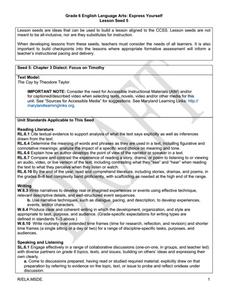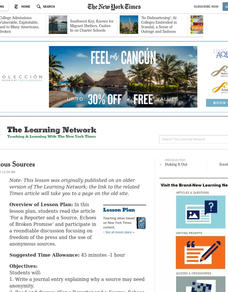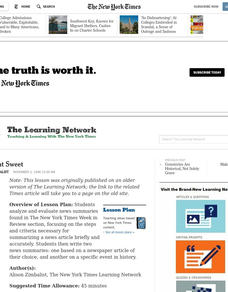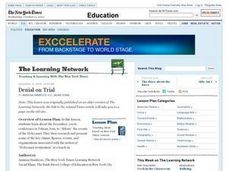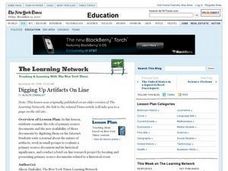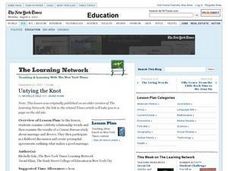PBS
Primary Sources
Students see how to use primary and secondary sources to investigate history. Whether it is a photograph, book, map, letter, postcard, newspaper, or official document, students can use sources to reconstruct and relive history.
Curated OER
Dialectical Journal Version 1
In this quotes worksheet, students find a book of quotes and choose 6 quotes to write down on the left and respond to on the right.
Warren County Public Schools
Citing Textual Evidence
By using explicit textual evidence, individuals can strongly support their ideas and opinions. The presentation suggests in order to use explicit textual evidence, one must state their idea, cite evidence in the text that led to the...
Nancy N. Boyles
Summary Frame for Story Text and Informational Text
Provide these templates as aids for pupils as they work to compose summaries of both stories and informational texts. The first two frames provide sentence starters to help learners structure their summaries and include all the necessary...
Library of Congress
Determining Point of View: Paul Revere and the Boston Massacre
If you're teaching point of view, this is the lesson plan for you! First, decipher the writer's point of view from a primary resource, then compare and contrast the primary source with a secondary source to explore the Paul Revere's...
Curated OER
Express Yourself Lesson Seed 5
Building on the previous activity in this series of lesson seeds, this plan focuses on the use of dialect in Theodore Taylor's novel, The Cay. Class members examine specific lines of text, use their reading journals to respond to the...
Curated OER
Dialectical Journal Version 2
In this dialectical journal worksheet, students read a story and then complete the chart to help them understand the text. Students write quotes in the left column and respond to the quotes in the right.
Curated OER
Anonymous Sources in the Media
When do people ask for anonymity? Why? After reading the New York Times article "For a Reporter and a Source, Echoes of Broken Promise," young readers participate in a roundtable discussion focusing on freedom of the press and the use of...
Curated OER
Laughing Matters
Is laughter really the best medicine? Middle and high schoolers discuss the truth behind this adage by reading and discussing a New York Times article about Dr. Patch Adams. They participate in a round-table debate in response to...
Curated OER
Rockefeller's Revenge: Exxon and Mobil Unite
Study the impact and possible outcomes of the Exxon-Mobil merger in your language arts, social studies, or economics class. Secondary learners evaluate a series of graphs, write a paragraph interpreting the data, and engage in class...
Curated OER
Short But Sweet
After analyzing and evaluating news summaries found in the New York Times "Week in Review" section, middle schoolers study the steps for summarizing a news article briefly and accurately. They write two news summaries: one on a newspaper...
Curated OER
Who Could Have Been Who
Can word choice affect a candidate's likeability? Use a New York Times lesson to explore how a presidential candidate's likeability factor can fluctuate in public opinion polls. Young readers choose a presidential election from their...
Curated OER
What Has Brown Done for You?
Learners review the facts of the court case Brown v. Board of Education. Next, they research recent court cases that uphold contrasting views on the landmark decision. They write opinions about these recent court cases from a 1954...
Curated OER
Denial on Trial
What is the "Faurisson Affair”? What is “Holocaust Revisionism”? What does freedom of speech entail? Do revisionists have a right to voice their ideas? Such questions are at the heart of a richly detailed, thought provoking lesson...
Curated OER
Loose Lips
Have your middle and high schoolers analyze instances of celebrities using racial slurs or making prejudiced comments in public. After reading an article, they consider the roots and effects of prejudice and bias. As a class, they...
Curated OER
Truth Be Told
Encourage your middle and high schoolers to share their memories of a recent event. After reading a New York Times article, they discuss Elie Wiesel's memoir, Night. They write their own memoir about a significant event that affected...
Curated OER
Pay to Play?
Lead your class in a discussion about how they believe money influences politics. After reading "Go Ahead, Try to Stop K Street" from the New York Times, they evaluate the claims in the article about the current lobbyist scandal in...
Curated OER
What a Relief!
How are disasters addressed by the Federal Government? This New York Times lesson, based on the article "Disaster Aid: The Mix of Mercy and Politics," prompts middle schoolers to discuss the idea of using a disaster declaration as a...
Curated OER
Family Life
What is family? Challenge your scholars to write an encompassing definition of what this word means to them. After reading "It May Be a Family Matter, But Just Try to Define Family," class members discuss the emotional issues surrounding...
Curated OER
Digging Up Artifacts On Line
Why is it important to preserve historical documents and artifacts? Examine the role of primary source documents and the availability of these documents on the Internet. Middle and high schoolers write a journal about the nature of...
Curated OER
Justice Is Blind, Colorblind That Is
It's so interesting to see kids respond to articles about education. To start the day, prompt learners to discuss the words colorblindness and diversity. Then, split your class in two and have one side read an article from 2007 and the...
Curated OER
Untying the Knot
What are the current trends in divorce? What contributes to this? Examine celebrity relationship trends and how they relate to the general public with this discussion lesson. Middle schoolers analyze the results of a Census Bureau study...
Curated OER
Read All About It! California History of the 30s and 40s
Explore the Great Depression! Discover the challenges people experienced during the time period. Learners investigate photographs from the Dust Bowl and WWII era and create a story line about the photographs, writing a newspaper article...
Curated OER
In God We Trust; All Others Pay Cash
Learners review their knowledge on the First Amendment. After reading an article, they identify specific church and state issues. Using the Internet, they research President Bush's proposal from a specific point of view. They summarize...







